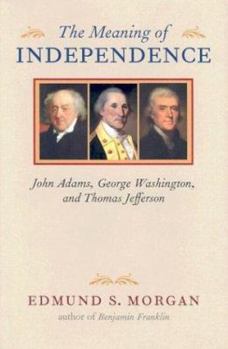The Meaning of Independence: John Adams, George Washington, and Thomas Jefferson
(Part of the Richard Lectures Series)
Select Format
Select Condition 
Book Overview
Americans did not at first cherish the idea of political severance from their mother country. In just a few years, however, they came to desire indepen-dence above all else. What brought about this change of feeling and how did it affect the lives of their citizens? To answer these questions, Edmund S. Morgan looks at three men who may fairly be called the "architects of independence," the first presidents of the United States. Anecdotes from their...
Format:Hardcover
Language:English
ISBN:0813906946
ISBN13:9780813906942
Release Date:December 1976
Publisher:University of Virginia Press
Length:96 Pages
Weight:0.62 lbs.
Dimensions:0.6" x 5.6" x 8.2"
Grade Range:Postsecondary and higher
Customer Reviews
5 ratings
quick and a good read for at home historians!
Published by cool book , 4 years ago
I had to purchase the book for my college Government course and it was a requirement. Any other time i might have been reluctant to read because I choose to study history of my culture or history from other parts of the world since I have been learning about American Government from k-12. But When I read the book I was intrigued and surprised. The book had elements that I had not even thought about and that made it more interesting. I didn't feel like I was reading for a course I felt like I was reading on my own agenda. if you'er a at home historian read this!
short AND interesting
Published by Thriftbooks.com User , 19 years ago
Easily read in an hour or two, this concise book is a nice little study of independence; what it meant to John Adams, George Washington, and Thomas Jefferson; and, through them, what it means to us. These three essays are not strictly biographical; Morgan does not sketch out the nitty-gritty of these Founders' lives. Rather, he takes a thematic, character-based approach to the individuals, using events to exemplify their traits, and uses them to flesh out the different takes on independence. Of the three, Morgan views Adams most negatively, sometimes portraying him as a man of mediocre talents. Readers of McCullough's biography might disagree, but Morgan does acknowledge that Adams was a "great American" (in that he placed his country above all other considerations), who bucked party and popular opinion and refused to go to war with France. For the aloof Washington, independence was shaped by honor and interest (usually the economic variety); he aimed to give the young country self-sufficience and status on the world stage. Both Adams and Washington, Morgan credibly suggests, might have lived obscure lives had crisis not forced them to rise above the mundane. Not so with Jefferson, clearly Morgan's favorite. Here, Morgan focuses on Jefferson's idea of a continuing revolution: that is, each generation most free itself from its predecessors. Jefferson's independence meant freedom from the past. The book is an interesting, sometimes insightful look at independence and these three men. It's not groundbreaking work, but it's good work--and surely worth a couple of hours.
A marvelous little collection of lectures
Published by Thriftbooks.com User , 24 years ago
Edmund Morgan is perhaps the most readable American colonial historian. Best known for his books on the Puritans and colonial slavery, Morgan here presents three lectures on what three founding fathers thought about independence. George Washington, John Adams, and Thomas Jefferson are three very complicated individuals, and no short lecture is going to completely explicate their ideas. But Morgan brings his typical verve and clarity to the subject, and speaking as a AP history teacher, I found them to be well worth my time.
Wonderful
Published by Thriftbooks.com User , 25 years ago
This is a truly fascinating and engaging work. The meaning of indepence from Great Britain is much more profound that one would think on first thought. With this idea in mind, Morgan penetrates to the fundamental ideas and characters of each three men. For both Washington and Adams, I must say that he is right on target. His account of Jefferson is also good, although I cannot help but wonder why Morgan spends some much time and space castigating the man for what he views to be his short-comings. Regardless of the actual merit of his criticisms, he clearly strays rather far from the subject of the work. Nevertheless, the piece as a whole is gem.
Fascinating for both serious and casual readers
Published by Thriftbooks.com User , 25 years ago
I first encountered Morgan's wonderful book in a college history class (thanks, Dr. Bourdon!), but this is no dry academic tome (personally, I think that there is no reason an academic book has to be dry, anyway). The book's three essays--one each on the named presidents and their points of view on the struggle that produced this nation--are both insightful and pleasurable reading. For the casual reader, there is Morgan's gift for anecdote. His description of the personality conflict between Adams and Benjamin Franklin is hilarious, as is Adams' timeless description of the tedium of legislatures (some things really do never change!). That said, there is also serious analysis of these three men, and what each contributed, thought, and said, written with a critcal but respectful tone. It's hard to say which essay is the best, but those who despise Thomas Jefferson for hypocrisy should certainly read his section, and learn about his genuine, if tempered, idealism--a trait we could use more of in the 1990's. This is an excellent choice for anyone who wants to broaden and deepen his or her knowledge of the origins of this country.






